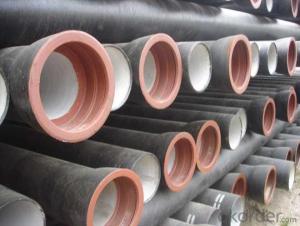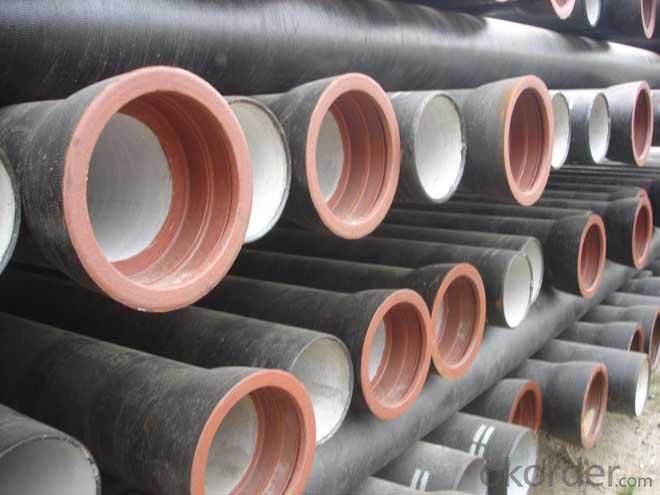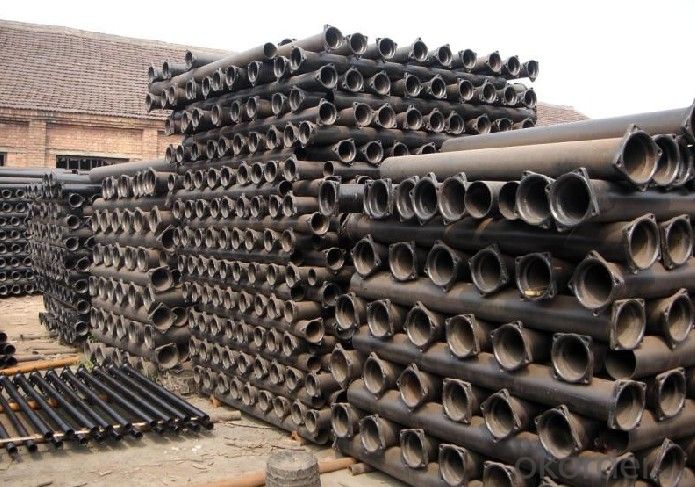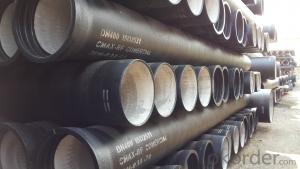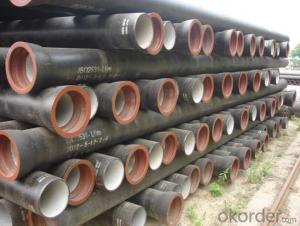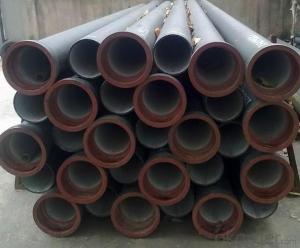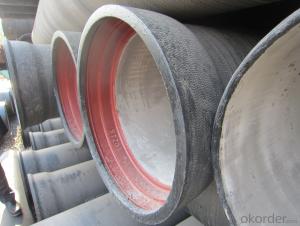Ductile Iron Pipe of China C40 EN545/EN598/ISO2531 on Chip Price
- Loading Port:
- China main port
- Payment Terms:
- TT or LC
- Min Order Qty:
- 23 m.t.
- Supply Capability:
- 500000 m.t./month
OKorder Service Pledge
OKorder Financial Service
You Might Also Like
1,Ductile Iron Pipe Description :
1) Pipes confirm to ISO2531,K9 class,T type joint,6m long,with inside cements lining conform to ISO4179, outside Zinc spraying(130g/m2) and bitumen coating(70μm) conform to ISO8179.
2) Pipe ends: Spigot and socket ends, with 100% SBR rubber gaskets accoding to ISO4633
3) we can do third party inspection according to customer's request.
4) Our products have been sold to many international market, such as Middle East and South East Asia and Africa.
2,Main Features of the Ductile Iron Pipe:
1. Material: Ductile iron grade 500-7/ 450-10 in accordance with ISO1083
2. Standard: ISO 2531, EN545, EN598, ANSI, AWWA
3. Certificate: ISO9001, ISO14001, SGS, NSF, WRAS
4. External coating: Zinc + Bitumen, conform to ISO8179
5. Rubber: NBR, SBR, EPDM according to ISO4633 / EN681.1
6. Note: The gaskets, bolts & nuts are supplied respectively as your special requirement
3,Ductile Iron Pipe Images:
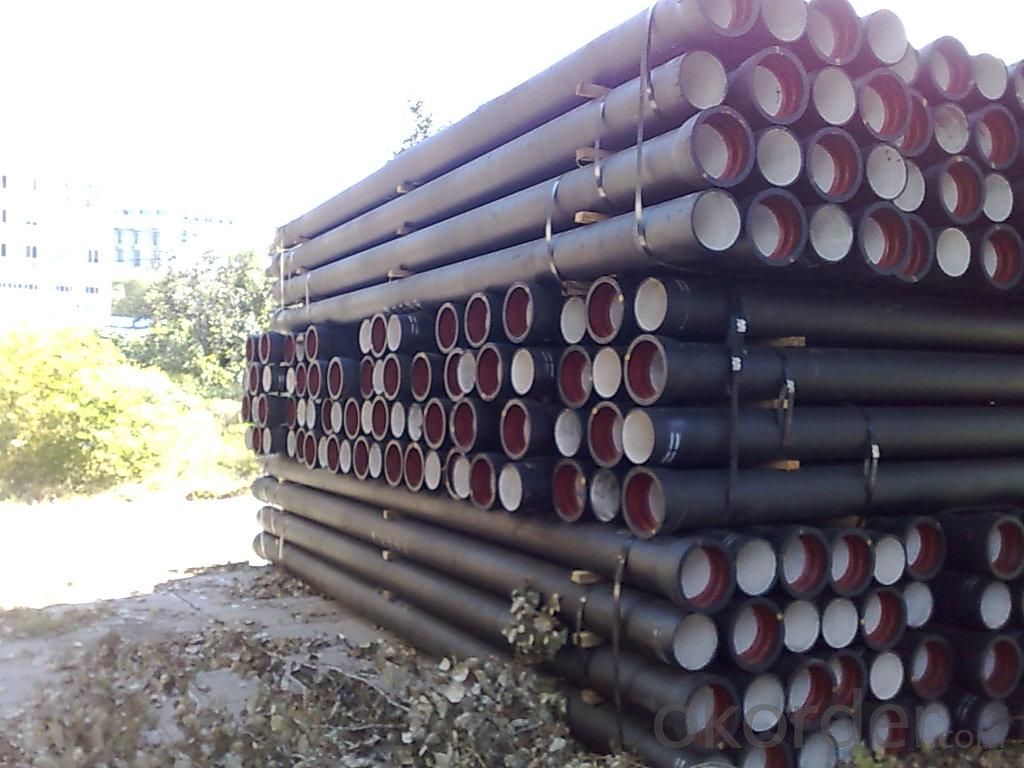
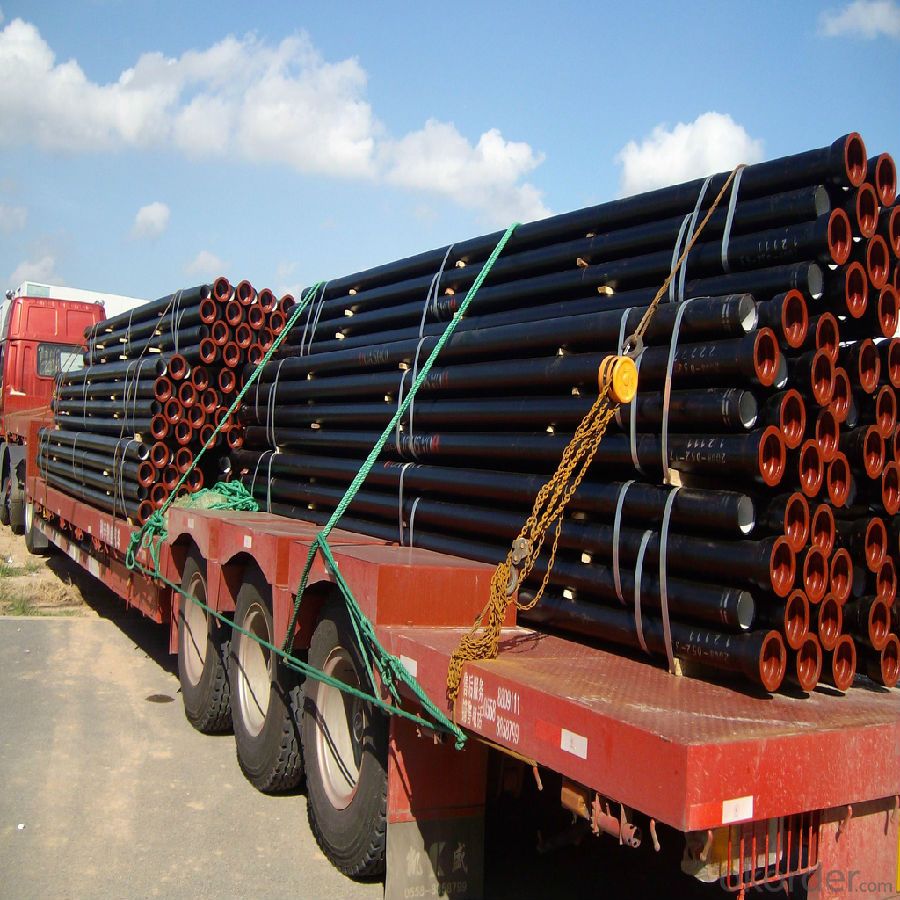
4. Ductile Iron Pipe Specification:
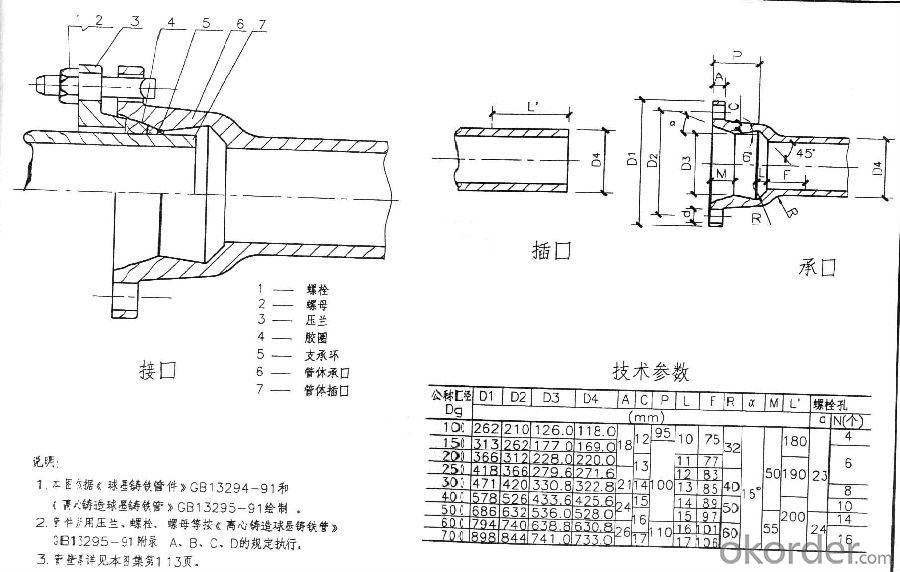
5.FAQ:
We have organized several common questions for our clients,may help you sincerely:
1.Q: Why would you choose ductile iron pipe rather than other pipe materials?
A:The reasons are obvious for that not only ductile iron pipe possesses the inherent strength and flexibility of ductile iron, combined with proven corrosion protection systems, but also the cost savings can be achieved from design to installation and commissioning.
2.Q:Why can you guarantee the inner of pipes can’t be corroded?
A: High alumina cement mortar lining and sulphate-resistant cement mortar lining. These two special linings are applicable to inner anti-corrosion for sewage pipes, improving resistance to erosion of the sewage components.
- Q: Are ductile iron pipes suitable for installation in areas with high groundwater salinity?
- Areas with high groundwater salinity are generally suitable for the installation of ductile iron pipes. Ductile iron is renowned for its resistance to corrosion, making it a favored choice for various applications, such as water and wastewater systems. High groundwater salinity refers to the increased presence of dissolved salts in the water. Although this can potentially cause corrosion in certain materials, ductile iron pipes are specifically engineered to withstand such conditions. These pipes are equipped with a protective lining, usually composed of cement mortar or polyurethane, which acts as a barrier between the pipe and its surroundings, including highly saline water. The lining serves to prevent any corrosive effects of the high groundwater salinity on the iron pipe, ensuring its long-lasting durability and reliability. Furthermore, ductile iron pipes possess a high tensile strength, enabling them to endure external loads and pressure, even in demanding environments. It is important to acknowledge that the suitability of ductile iron pipes for areas with high groundwater salinity can also be influenced by factors such as the specific levels of salinity, the presence of other corrosive agents, and the overall design and installation practices. Therefore, it is advisable to consult experts or engineers who are familiar with the local conditions in order to determine the most appropriate materials and precautions for specific installation projects.
- Q: How are ductile iron pipes repaired in case of damage?
- Due to their high durability and strength, ductile iron pipes are commonly utilized in various applications. However, like any other materials, these pipes can sustain damage over time due to external influences or internal corrosion. In such instances, there exist several techniques available for repairing ductile iron pipes. One prevalent method is the trenchless repair technique, which allows for the restoration of the damaged section without the need for extensive excavation. This method typically employs specialized equipment to access and repair the affected area. Its advantages lie in minimizing disruption to the surrounding environment and reducing excavation costs. Another approach for repairing ductile iron pipes involves the application of epoxy lining. This process entails the use of epoxy resin to seal any cracks or leaks on the interior surface of the pipe. Epoxy lining is a cost-efficient and effective solution as it provides long-lasting repairs and enhances the overall condition of the pipe. In cases where the damage is severe or extensive, it may be necessary to replace the damaged section of the ductile iron pipe. This typically involves removing the compromised portion and installing a new pipe section. The replacement process may require excavation and can be more time-consuming and costly compared to other repair methods. Nonetheless, it guarantees a comprehensive and permanent solution for the damaged pipe. It is essential to note that the choice of repair method for ductile iron pipes depends on factors such as the extent of the damage and accessibility. Professional assessment and inspection play a crucial role in determining the most suitable repair technique. Consulting experienced pipeline repair specialists or civil engineers is highly recommended to ensure the most effective and durable repair solution for ductile iron pipes.
- Q: Can ductile iron pipes be used for wastewater pumping stations?
- Yes, ductile iron pipes can be used for wastewater pumping stations. Ductile iron pipes have excellent strength and durability, making them suitable for transporting wastewater and handling the high pressures and corrosive nature of the sewage. Additionally, ductile iron pipes have a smooth interior surface, which prevents clogs and allows for efficient flow of wastewater. These pipes are also resistant to damage from external factors such as soil movement or heavy traffic, making them a reliable choice for wastewater pumping stations.
- Q: What is the use of ductile iron?
- Ductile iron is used as a conduit at the beginning. Iron pipes and fittings are mostly produced by major industrial countries. Their manufacture, design and use are in line with national standards and international standards and procedures (I502531). As far as water and other liquids are concerned, it has long been proved that ductile iron pipes are superior to gray iron pipes. The main reason for this change is the combination of strength and toughness of Ferritic Ductile Iron, which makes the pipes made of this material subject to high operating pressures and can be readily loaded and laid during laying. A gas pipeline must be able to withstand multiple use requirements, which stand near the pipeline excavation and municipal engineering construction and transportation, where the ball iron pipes with high strength, high performance and simple installation and connection technology has proved that this material selection is decisive.
- Q: Are ductile iron pipes resistant to biological growth?
- Yes, ductile iron pipes are generally resistant to biological growth. Ductile iron is a strong and durable material that is commonly used in water and sewage systems. Its smooth surface inhibits the growth of bacteria, fungi, and other microorganisms that can contribute to biological growth. Additionally, ductile iron pipes are often coated with protective linings or coatings, such as cement mortar or epoxy, which further enhance their resistance to biological growth. However, it is important to note that no material is completely immune to biological growth, and regular maintenance and cleaning of the pipes may still be required to ensure long-term resistance.
- Q: Are ductile iron pipes suitable for industrial applications?
- Yes, ductile iron pipes are highly suitable for industrial applications. Ductile iron is a strong and durable material that possesses excellent mechanical properties, making it ideal for handling high-pressure and heavy-duty applications. The pipes have a high tensile strength and can withstand extreme conditions, including high temperatures and corrosive environments. Furthermore, ductile iron pipes have superior resistance to cracking and fracturing, ensuring a longer lifespan and reduced maintenance costs. They are also highly resistant to external loads, making them suitable for underground installations and industrial settings where they may be subjected to heavy loads or vibrations. Moreover, ductile iron pipes have excellent flow characteristics due to their smooth interior surface, allowing for efficient fluid transportation in industrial systems. They also have good resistance to wear and abrasion, ensuring a consistent flow rate over time. Additionally, ductile iron pipes are versatile and can be used in various industrial applications such as water supply, wastewater treatment, industrial processes, and mining operations. They are available in a wide range of sizes to accommodate different requirements and can be easily connected using various jointing methods. Overall, ductile iron pipes offer the reliability, strength, and longevity required for industrial applications, making them a suitable choice for industries where durability and performance are crucial.
- Q: What is the content of silicon in silicon molybdenum ductile iron?
- High silicon molybdenum ductile cast iron is developed for end users successfully reduces the cost, and the castings have high strength, good oxidation resistance, and has good performance under thermal cycling condition. This kind of ductile iron silicon content of 4% molybdenum content 0.6%-0.8%, currently designated as many car manifold and turbocharger shell, and molybdenum content than the silicon alloy casting 1% more for special high temperature exhaust pipe, heat treatment. High silicon molybdenum alloy nodular cast iron castings used in the production of automotive turbocharger.
- Q: What are the advantages of using ductile iron pipe over HDPE pipe?
- Ductile iron pipe offers several advantages over HDPE pipe. Firstly, it has a higher strength and durability, making it suitable for high-pressure and heavy-duty applications. Secondly, it has better resistance to external loads, such as traffic or soil pressure. Additionally, ductile iron pipe has superior fire resistance and is less susceptible to damage from UV rays. Moreover, it has a longer lifespan and requires less maintenance compared to HDPE pipe. Lastly, ductile iron pipe has better flow characteristics, resulting in lower energy consumption for pumping systems.
- Q: Can ductile iron pipes be used for water treatment facilities?
- Yes, ductile iron pipes can be used for water treatment facilities. Ductile iron pipes are known for their strength, durability, and corrosion resistance, making them suitable for transporting water in various treatment processes such as filtration, disinfection, and distribution. Their ability to withstand high pressures and external loads makes them a reliable choice for water treatment facilities.
- Q: Are ductile iron pipes resistant to sulfuric acid corrosion?
- Yes, ductile iron pipes are generally resistant to sulfuric acid corrosion. Ductile iron is a strong and durable material that contains a high percentage of iron, making it less susceptible to the corrosive effects of sulfuric acid compared to other materials like cast iron or steel. However, it is important to note that the level of resistance can vary depending on factors such as the concentration and temperature of the sulfuric acid, as well as the duration of exposure. In highly concentrated or elevated temperature environments, additional protective measures such as lining the pipes with suitable materials or employing corrosion inhibitors may be necessary to ensure long-term resistance to sulfuric acid corrosion.
Send your message to us
Ductile Iron Pipe of China C40 EN545/EN598/ISO2531 on Chip Price
- Loading Port:
- China main port
- Payment Terms:
- TT or LC
- Min Order Qty:
- 23 m.t.
- Supply Capability:
- 500000 m.t./month
OKorder Service Pledge
OKorder Financial Service
Similar products
Hot products
Hot Searches
Related keywords
